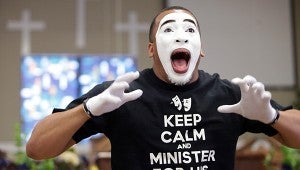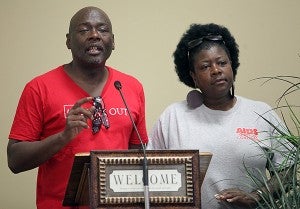Rally seeks HIV awareness
Published 12:00 am Sunday, June 15, 2014
A statewide program to increase HIV awareness in youth kicked off Saturday in Vicksburg with mimes, a Powerpoint program on the disease and confidential HIV testing for those who wanted it.

Daniel Harris performs Saturday with the Messengers of Christ Mime Ministry during the Wake Up Youth Rally, which is used to raise awareness of HIV, AIDS and other issues facing youth in community at Greater Grove Street Missionary Baptist Church
About 30 people, including Mayor George Flaggs Jr. and Warren County Sheriff Martin Pace, attended the Wake Up Rally program at Greater Grove Street M.B. Church.
“When it (HIV/AIDS) came on the scene in the 80s, it was something that was really, really talked about, but I feel now in 2014, we don’t talk about it, and so therefore they’re (youth) ignorant about it, and they don’t know any better,” said Tanna Williams, one of the program’s organizers.
“They get it, and don’t know that they have it, and are transmitting and transferring it and they don’t even know about it,” she said. “I feel if we inform the next generation, maybe the numbers will go down and the third highest state (in HIV infection) in the nation will be the lowest.”
The program was co-sponsored by the HIV Foundation, Mississippi in Action and My Brother’s Keeper. Luke Versher with the HIV Foundation said the next program is planned for Jackson next month.
Versher said the south and Mississippi has seen an increase in HIV infection, particularly in the rural areas.
According to the Mississippi Department of Health, young people age 13 to 24 made up 30 percent of the HIV cases in the state as of 2012, the most recent statistics available. Overall, black men made up 75 percent of all HIV cases, the report shows.

Luke Versher, left, and Valencia Robinson speak Saturday during the Wake Up Youth Rally, which is used to raise awareness of HIV, AIDS and other issues facing youth in community at Greater Grove Street Missionary Baptist Church.
“The epidemic has shifted south,” he said. “In Mississippi, the biggest challenge is overcoming the stigma, access to care, and the failure to expand Medicaid. We are preparing a bill for the Legislature to start addressing funding for HIV care.”
“We don’t have comprehensive sex education in Mississippi,” Valencia Robinson of Mississippi in Action said. “We had abstinence education, but it didn’t help, because schools had the opportunity to opt out of sex education. We’re trying to get our young people to wake up. I don’t think youth understand the importance of getting to know their HIV standing, safer sex practices, and even abstinence. This is our beginning.”
Talking to the group assembled in the sanctuary of Greater Grove Street, Versher said he had HIV. “I was diagnosed 26 years ago. The same year Magic Johnson was,” he said.
“There are many misconceptions about HIV, and we’re here today to dispel some of those rumors,” he said. “There is the stigma and ignorance surrounding it. It doesn’t mean someone is stupid; only means that you are unaware.”
He asked the group how they would treat someone who was HIV positive. One girl expressed fear she would catch the disease by being with someone with HIV. Versher discussed how the disease is transmitted, adding casual contact does not spread the disease.
He said caught early enough, HIV can be controlled.
“But people won’t go to the hospital, or won’t go get treatment, until their sick,” he said.
HIV, he said, is not only sexually transmitted. “It’s (also) transmitted by sharing needles.”
Robinson told the group HIV can only be determined by a doctor through a blood test. She said parents and children have to talk together and understand each other when talking about sex and HIV.
“We have to be honest when we talk with each other. We have to be straight with each other,” she said.
“I’ve heard what you all discuss,” she told the teens in the audience. “You need to know the meanings of the words and the terms you’re using.”
Flaggs commended the program, adding, “anytime you raise the awareness of a disease such as AIDs, it’s important.” Flaggs, a former state representative, discussed the Legislature’s process to increase support for HIV/AIDs awareness and treatment.
He said the state needs to remember that HIV is not relegated to one group of people or activity.
“They have to realize that it’s not a lifestyle problem, it’s a health a problem and I believe with anything this deadly, we need to be sounding an alarm.”
Pace said he has seen an increase in heroin use in the county because the drug is cheap to obtain.
“There is only one way to use heroin, and people will got to Rite Aid or Walgreens or Walmart to buy needles to use,” he said.
“Heroin addicts well tell you they have no problem buying it from their dealer, because he doesn’t care, but they are scared to go to Rite Aid or Walgreens or Walmart to buy needles, because the person they see sitting there might be the same person who sits behind them in church on Sunday and will ask why they’re buying a bag of needles. So they use one and they share it. They don’t know if the other person has HIV or not.”
He urged people think about their actions before they get in a situation that might cause them to contract the HIV virus.
“You can’t pretend it doesn’t exist, because it does,” he said.






